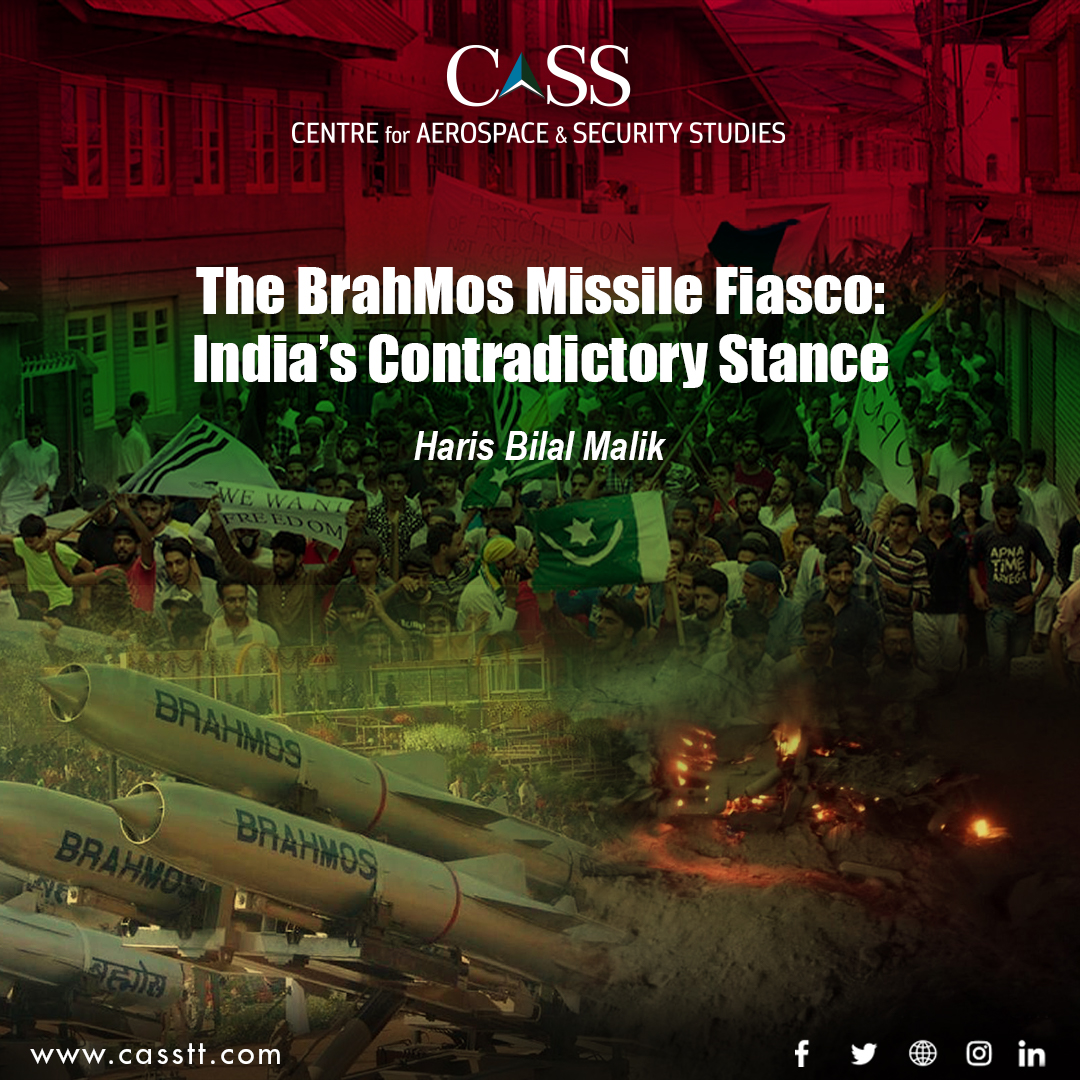Apart from the ongoing political and economic turmoil in Pakistan, devastating floods, and the complex regional and international security environment, another piece of news has been making the headlines. The news is related to the missile incident that took place earlier this year on 9th March 2022. An Indian cruise missile, reportedly BrahMos, entered Pakistan’s territory and crashed in the area of Mian Channu, Punjab. India officially regretted the incident, announcing that it was the result of a technical malfunction during a regular maintenance exercise. However, this position has remained suspicious to date and a lot of speculations regarding the nature of this incident were made. Subsequently, the Indian government formed a ‘Court of Inquiry’ (CoI), which found a deviation from ‘Standard Operating Procedures’ (SOPs), for which three officers – a Group Captain, a Wing Commander, and a Squadron Leader – of the Indian Air Force (IAF) were found responsible and sacked.
Despite the fact that the CoI has established responsibility, it still raises some pertinent questions that need to be addressed. First and foremost is what to believe – India’s initial position of a technical malfunction or the new position of deviation from the SOPs? Is the action taken by the Indian government, for such a sensitive issue, that too after more than five months of the incident, enough? Further, are the CoI’s findings an attempt by the Government of India to divert attention from its poor domestic environment?
In an earlier article on the subject, I maintained that the Indian claim of ‘accidental launch’ due to technical malfunction was questionable and unverifiable. This assumption was based on some technical grounds – since BrahMos is a cruise missile, which are guided and always follow a pre-set flight path, the Indian accidental launch claim was dubious from the beginning. And now, the new Indian position that the missile launch was a result of non-adherence to the SOPs by the authorised person(s) on the ground, itself vindicates my earlier argument that a cruise missile cannot launch on its own, it definitely needs a flight trajectory. This implies that the BrahMos missile incident was a case of unauthorised launch rather than the occurrence of a technical malfunction that led to an accidental launch.
As far as the justification of the action taken by the Indian government is concerned, it took more than five months for the CoI to find the facts. A very sensitive issue like this has been concluded by just identifying that the SOPs were not followed. This is an over-simplistic explanation for an incident that could invoke devastating consequences. For any responsible nuclear weapon state, there are mechanisms of nuclear Command and Control, there are protocols for the employment of strategic delivery systems, and there are measures for the overall safety and security of strategic weapons. Failure at all these levels cannot be simply explained by leaning on violation of SOPs – it raises more questions than answers.
Another important aspect could be the impact of this incident on the potential export of BrahMos cruise missiles. The Indian government has already agreed to sell BrahMos to the Philippines while talks with Indonesia are reportedly at advanced stages. India also intends to export this missile to other countries. However, if it was established by the CoI that the incident was a result of a ‘technical malfunction’, this could have a negative impact on its potential export. Whereas by sacking three officers, it could be propagated that there was a human error rather than a technical problem in the missile.
Despite not being directly linked, one can also argue that the Indian government is trying to divert attention away from its poor internal issues. For instance, with regards to what it has recently done in Indian Occupied Jammu & Kashmir by allowing voting rights to non-local Kashmiris, Indian farmers again protesting and coming onto roads, and the growing popularity of the Aam Aadmi Party (AAP) – all these are creating difficulties for the Modi government.
Pakistan needs to draw relevant lessons from this whole fiasco in order to have a better play of its nuclear deterrent capabilities. What if there was a Pulwama-like crisis situation and the incident (either accidental or unauthorised launch) had taken place, especially if the missile was armed with a nuclear warhead? This would have brought disastrous consequences for the whole region. Any miscalculation from either side could have resulted in a first-ever nuclear exchange between the two South Asian arch-rivals. Given the lack of trust on both sides, such a situation could have been misperceived or miscalculated during heightened tension. Pakistan’s threat perception during such a time would be drastically different from that during ‘peace time’. An important lesson for Pakistan could be, that it needs to be fully cognizant of the likelihood of similar irresponsible behaviour by India in the future, which later on may end up being closed as an ‘accidental launch’ but which will put the stability of the region at stake. Further, Pakistan, apart from just rejecting India’s contradictory stances, needs to become more proactive and lobby the international community about India’s irresponsible behaviour as a state that possesses nuclear weapons and continues to expand its nuclear forces.
Haris Bilal Malik is a Researcher at the Centre for Aerospace & Security Studies (CASS), Islamabad, Pakistan. The article was first published in Strafasia. He can be reached at [email protected]m.
Image credit: Online Sources





